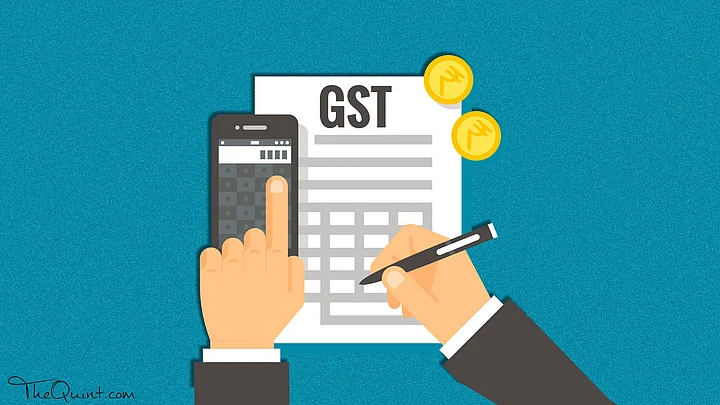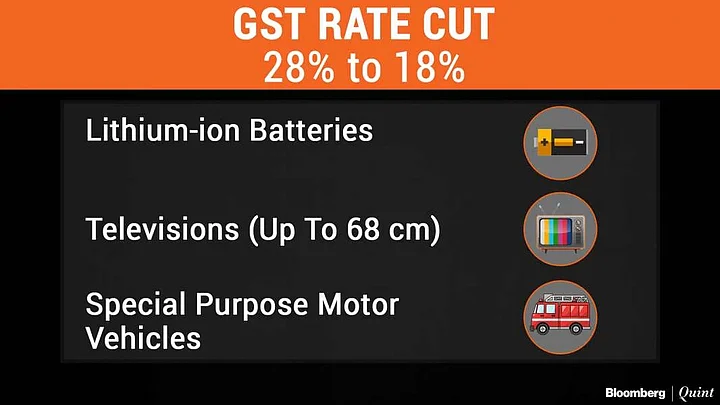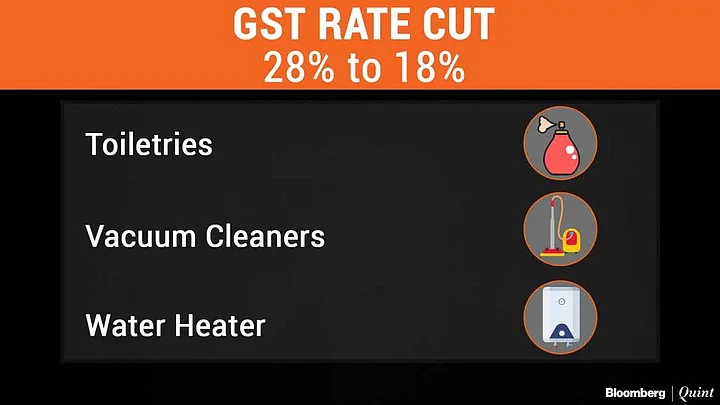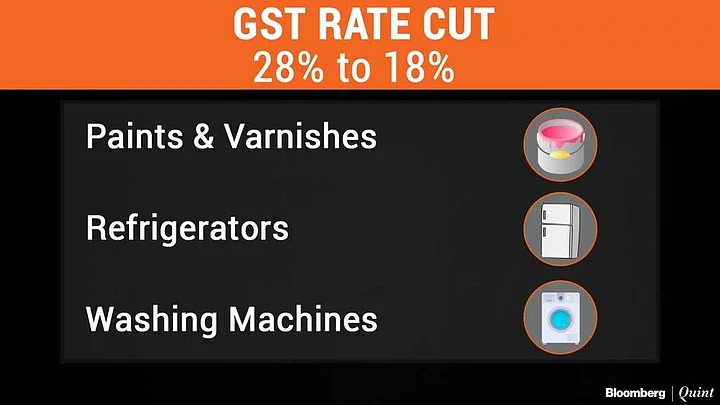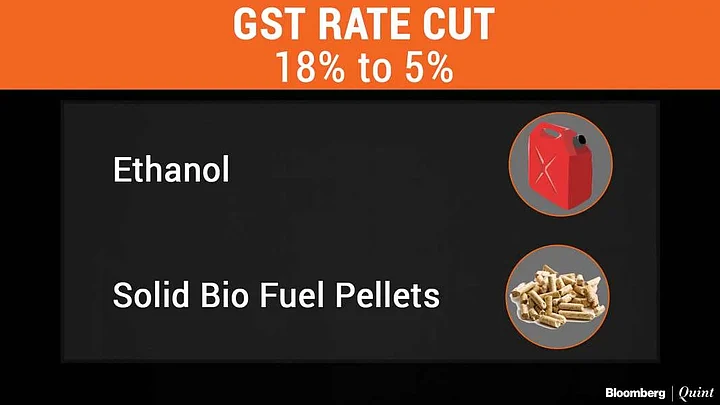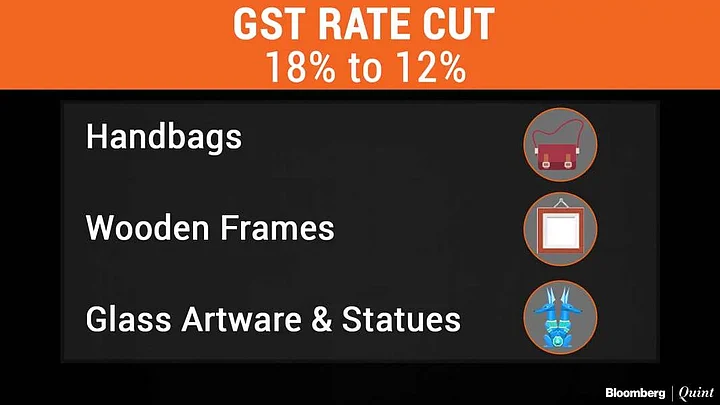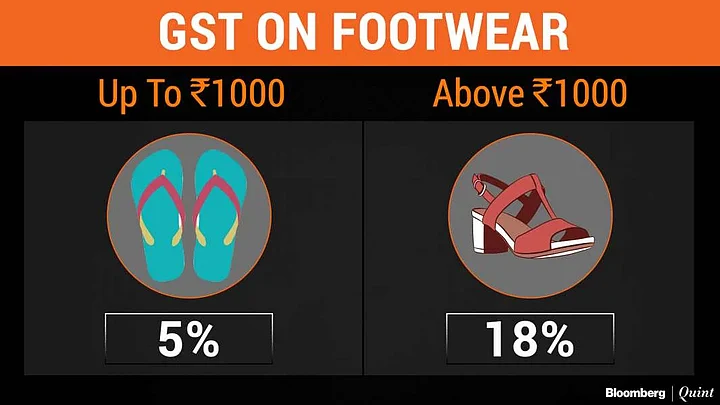A number of items, including sanitary napkins and washing machines, are set to get cheaper starting Friday, 27 July, as revised GST rates come into effect.
The decision comes after a nine-hour long GST Council meet last week ended with several important decisions – rate cuts, a simplified return filing process, benefit of input credit refund for the textile sector and a benign tax regime for composition dealers, among others.
28 Percent Tax Slab Gets Leaner
The GST Council has reduced the tax rate on over 50 goods, including washing machines, refrigerators, vacuum cleaners, paints, ethanol, cosmetics, sanitary napkins.
Reducing the rate on items that were currently taxed at 28 percent would potentially have a revenue implication of Rs 6,000 crore, Assam Finance Minister Himanta Biswa Sarma told BloombergQuint.
“Exempting an item from GST does not necessarily make it cheaper. If a final product is exempted from GST, the manufacturer cannot claim credit for inputs used for making it, which in turn becomes a cost,” Abhishek Jain, an indirect tax partner at EY India explained.
For instance, exempting sanitary napkins from GST – which are currently taxed at 12 percent – should reduce their cost. However, the reduction may not be the entire 12 percent as credit on inputs would not be available, and become a cost.Abhishek Jain, Partner, EY India
The changes in tax rate would come into effect from 27 July 2018, said a press release issued by the Ministry of Finance.
The GST Council has also decided to levy GST on transaction value of hotel rooms instead of declared tariffs. Hotels used to levy GST on their declared tariff even when they used to offer discounts to customers.
This is a big relief for the hospitality sector as customers used to protest on GST being levied on a higher tariff rate rather than discounted rates, Manbeer Sandhu, president of Hotel and Restaurant Association of Haryana pointed out.
This will help customers as well since the benefit of GST being applied to a discounted rate will be passed on to them.Manbeer Sandhu, President, Hotel and Restaurant Association of Haryana
While this is positive for consumers and the hotel industry, there’s another related issue that hasn’t been addressed yet, Abhishek Rastogi, partner at law firm Khaitan & Co. told BloombergQuint. Companies spend a considerable amount to avail hotel services and a majority of it is in states where they may not be necessarily registered. This leads to problems on the input tax credit front, Rastogi explained.
Credit availment is a problem in cases where the hotel is located in one state and the taxpayer is registered in another state. The input tax credit is not available in the state where you’re paying the taxes since you’re not registered there. I think that’s the second fundamental problem which arises for companies.Abhishek Rastogi, Partner, Khaitan & Co.
Textile Sector: GST To Get Less Taxing?
The textile sector will now be eligible for input tax credit refunds. The GST regime for textile industry has been rather strange so far, L Badrinarayan, a partner at Lakshmikumaran & Sreedharan pointed out. For instance, a taxpayer is selling fabric which is taxed at 5 percent but the input for it, let’s say, polyester yarn is taxed at 18 percent. There was an accumulation of credit for such businesses.
Textile companies have been saying that this has been making them uncompetitive in the foreign market. Majority of the textiles are exported from either Pakistan, Bangladesh or India. The minute there is even a 1 percent increase in the cost of textile, the exports move from India to Pakistan and Bangladesh.L Badrinarayan, Partner, Lakshmikumaran & Sreedharan
The only hitch here is that it is going to be prospective and so whatever textile credit has accumulated in the books of companies will lapse, Badrinarayan added.
For this measure to be meaningful, the refunds should come on time or else the textile sector – that largely consists of small businesses – will continue to face cash flow issues, Chandrakant Salunkhe, the president at the SME Chamber of India said.
Return Filing: Sahaj & Sugam
After months of deliberation, the Council has agreed on a simplified return filing process...one that is also narrower in its applicability.
Small taxpayers – with a turnover of up to Rs 5 crore – can now opt for filing quarterly returns. However, they will have to pay GST on a monthly basis.
Simplified returns for small taxpayers have been called Sahaj and Sugam and will need less information compared to regular GST returns. 93 percent of the taxpayers have a turnover of less than Rs 5 crore and these taxpayers would benefit substantially from the simplification measures, a media note by the Finance Ministry said.
Those with a turnover above Rs 5 crore will benefit as well, it added.
The return form will have two main tables – one for reporting outward supplies and one for availing input tax credit based on invoices uploaded by the supplier. Invoices can be uploaded continuously by the seller and can be continuously viewed and locked by the buyer for availing input tax credit.
This process would ensure that very large part of the return is automatically filled based on the invoices uploaded by the buyer and the seller. The process would be ‘Upload-Lock-Pay’ for most tax payers.
The new return design will also provide the option to amend the invoice, the release pointed out. An amendment can be made by filing an amendment return. Payment would be allowed to be made through the amendment return as it will help save interest liability for the taxpayers, the release added.
This will reduce compliance, but a difference in timing of filing of returns for assessees with a turnover above and below Rs 5 crore may impact timing of the availment of credit, Bipin Sapra, an indirect tax expert at EY India, said in an emailed statement.
Benign Regime For Composition Dealers
Currently, taxpayers with an annual turnover below Rs 1 crore can avail of the composition scheme. Under this scheme, taxpayers have to pay a flat GST rate but the benefit of claiming input credit is not available.
The Council has now increased the threshold for this scheme to Rs 1.5 crore. Taxpayers under composition scheme will also be allowed to supply services, whose value should not exceed 10 percent of turnover in the preceding financial year, or Rs 5 lakh, whichever is higher. These services cannot be in the restaurant space, as restaurant owners cannot avail of composition scheme.
The Council also decided to defer the implementation of the reverse charge mechanism to September next year.
Under reverse charge, the receiver of goods has to pay GST instead of the supplier.
The next meeting of the GST Council will be on 4 August, and will focus on issues and problems faced by medium and small scale industries.
(This story was first published on BloombergQuint)
(At The Quint, we question everything. Play an active role in shaping our journalism by becoming a member today.)
